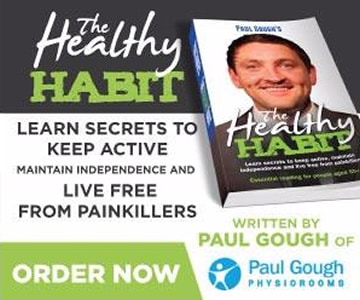
It’s been cold the last couple of weeks here in the North East. Not just cold, but bitterly cold, (I’m sure you don’t need reminding!).
And because it’s been freezing out, we’ve had a lot more people than usual struggling with aches and pains in their joints call up the Physio Rooms for help.
Have you been feeling the cold in your bones too?
If you have, and you’ve been experiencing more joint pain than usual, or if you’re just beginning to notice it – I wanted to share some tips with you this week that we’ve been giving our patients to help ease aches and help you get by each day with a lot less pain.
Let’s dive in…
Exercise with care – to keep your joints moving a pain-free when it’s cold outside, frequent exercise is a must.
If you’re not a fan of exercise, don’t worry, I’m not talking about doing anything strenuous – I’m talking about simply moving your body and taking part in low-impact exercises that don’t put strain on your joints.
Think swimming, walking on the treadmill and outdoors (though if it’s icy avoid pavements as they can be treacherous this time of year), and leisurely paced cycling on an exercise bike.
Pilates and Yoga are also excellent for keeping your joints supple. Aim to add some form of movement into your day, everyday.
Big tip: Always warm up before you exercise, especially during the colder months, and when you’re done treat yourself to a nice warm bath to relieve any exercise aches and pains.
Eat fatty fish for dinner – Fond of salmon and mackerel? These delicious oily fish are rich in omega-3 fatty acids, which aside from their myriad of benefits, they help reduce joint inflammation and ease the pain associated with arthritis.
These types of oily fish also contain vitamin D3 which plays an important role in keeping your bones healthy.
Tip: Try to eat two to three portions of fatty fish a week if you can, or think about supplementing your diet with fish oil capsules.
Stock up on supplements – you might hear a lot about the importance of taking supplements, and that’s because taking certain ones over time work perfectly to sooth joints and may even protect your cartilage from damage.
Get your hands on supplements like glucosamine, omega-3 fish oils and vitamin C. As always, before starting any dietary supplement check with your Doctor if a supplement safe for you to take.
Be footwear-wise – What you wear on your feet is especially important this time of year. Given the potential for icy pavements, falls are more common and many people who suffer from arthritis report worsening symptoms in Winter.
So what shoes should you wear? Ideally, wear flat, supportive rubber soled shoes or boots so you don’t slip.
What not to wear? Avoid wearing high heels if you can. Not only do heels increase the chance of having a fall, heels put extra stress on your legs and back so they aren’t the best type of shoe wear daily, or for prolonged periods of time.
Keep your joints warm – Whether you’re susceptible to achy joints or not, keeping warm is crucial. When you’re feeling cold your muscles tense up and stiffen, making them more prone to injury and general discomfort.
Don’t forget the thermals and wrap up well in layers to keep yourself warm. Look for the most snug gloves and socks money can buy. If you still find you just can’t heat up, get some of those gel heat pads you can wear inside your gloves and pop in your boots so the cold doesn’t affect you.
Treat your pain naturally – You don’t have to resort to medication to soothe aching joints. Heat for instance is a wonderful joint pain reliever. As well as warm baths, try alleviating your aches with warm compresses and heat pads.
Massage is also very effective and is something our clients always come back for to keep those aches at bay after treatment – you don’t even have to be receiving treatment to book yourself in for one.
Keep yourself warm and look after your joints – following these tips should help you on your way to having a lot less pain during the colder weather.
P.S. If you’ve got any aches and pains right now, and your back feels bad since it’s been colder outside, head to this website to download our free tips guide with plenty more actionable advice to help ease back pain: http://www.paulgoughphysio.com/back-pain


